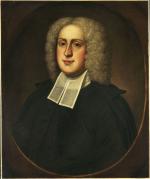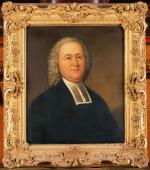![header=[Marker Text] body=[Pioneer academy, located here by 1728, when land was given for the school. Founded in 1727 by William Tennent, minister of the Presbyterian Church west of Hartsville. A forerunner of Princeton University.] sign](kora/files/1/10/1-A-36A-139-ExplorePAHistory-a0m0l8-a_450.jpg)
Mouse over for marker text
Name:
The Log College
Region:
Philadelphia and its Countryside/Lehigh Valley
County:
Bucks
Marker Location:
Pa. 263 SW of Jamison
Dedication Date:
November 17, 1947
Behind the Marker
Eighteenth-century British North America was alive with intellectual enthusiasm and evangelical fervor associated with a wave of religious revivals known as the Great Awakening. Best associated with such seminal Protestant ministers as Jonathan Edwards, George Whitefield, and John Wesley, the Awakening had deep social and spiritual significance in the fast-growing English colonies.
A sparse frontier outpost known as the Log College was one of the numerous church-affiliated seminaries and colleges that sprang up in the era. Some believe it was the first of its kind, an institution for the training of Presbyterian ministers in the British colonies. Between 1727 and 1745, this backcountry seminary exerted a significant influence on colonial education and Presbyterian Church polity.
Founded in 1727 and relocated to rural Bucks County the next year, the so-called Log College was established by William Tennent, an Irish-born and Edinburgh-educated Presbyterian minister dedicated to preparing a learned clergy for the burgeoning colonial congregation. The college, such as it was, opened just as a new wave of evangelical fervor swept over Pennsylvania and the Middle Colonies. Some dispute whether the school was a college in the formal, European sense of the word, or merely a seminary. Its curriculum was simple but demanding, and Tennent was the school's ombudsman and guiding force.
In a log-framed structure little more than twenty feet in length, Tennent drilled his students in the classical languages, Scripture studies, and a new style of preaching championed by the Awakening's so-called New Lights. Critics complained not so much of the theological exegesis as the "enthusiasm" with which Tennent's charges preached from the pulpit. Some traditionalists found the emotionalism too theatrical and less solemn than more conventional preaching styles, but Tennent and his disciples persevered with great success.
The Log College's surroundings were modest at best, and creature comforts were few, but Tennent gained an influential following. His graduates, including four sons, grew to prominence throughout the Middle Colonies, establishing churches and schools modeled on the Log College. In time their influence spread far beyond the fledgling academy in the Pennsylvania backcountry.
The Log College is sometimes mistakenly associated with the 1746 founding of the College of New Jersey, which later became Princeton University. The ties are not so direct, but they are important. Three of the early trustees and benefactors were graduates of the Log College. Samuel Blair, Gilbert Tennent, and William Tennent, Jr. exerted an important influence on the first generation of students. Log Cabin graduate Samuel Finley later served as Princeton's fifth president, and his predecessor, Samuel Davies, had studied under Blair.
There is some disagreement about when the Log College ceased operations, but most agree that instruction had halted by the time of William Tennent's death in 1745. His pupils applied his approach to learning as a sacred task from the pulpit and the podium in Presbyterian churches and colleges throughout the colonies. Like Tennent, they believed that education in service to God was the highest calling, and with great zeal they joined personal piety and intellectual curiosity with a new style of evangelical ministry.
A sparse frontier outpost known as the Log College was one of the numerous church-affiliated seminaries and colleges that sprang up in the era. Some believe it was the first of its kind, an institution for the training of Presbyterian ministers in the British colonies. Between 1727 and 1745, this backcountry seminary exerted a significant influence on colonial education and Presbyterian Church polity.
Founded in 1727 and relocated to rural Bucks County the next year, the so-called Log College was established by William Tennent, an Irish-born and Edinburgh-educated Presbyterian minister dedicated to preparing a learned clergy for the burgeoning colonial congregation. The college, such as it was, opened just as a new wave of evangelical fervor swept over Pennsylvania and the Middle Colonies. Some dispute whether the school was a college in the formal, European sense of the word, or merely a seminary. Its curriculum was simple but demanding, and Tennent was the school's ombudsman and guiding force.
In a log-framed structure little more than twenty feet in length, Tennent drilled his students in the classical languages, Scripture studies, and a new style of preaching championed by the Awakening's so-called New Lights. Critics complained not so much of the theological exegesis as the "enthusiasm" with which Tennent's charges preached from the pulpit. Some traditionalists found the emotionalism too theatrical and less solemn than more conventional preaching styles, but Tennent and his disciples persevered with great success.
The Log College's surroundings were modest at best, and creature comforts were few, but Tennent gained an influential following. His graduates, including four sons, grew to prominence throughout the Middle Colonies, establishing churches and schools modeled on the Log College. In time their influence spread far beyond the fledgling academy in the Pennsylvania backcountry.
The Log College is sometimes mistakenly associated with the 1746 founding of the College of New Jersey, which later became Princeton University. The ties are not so direct, but they are important. Three of the early trustees and benefactors were graduates of the Log College. Samuel Blair, Gilbert Tennent, and William Tennent, Jr. exerted an important influence on the first generation of students. Log Cabin graduate Samuel Finley later served as Princeton's fifth president, and his predecessor, Samuel Davies, had studied under Blair.
There is some disagreement about when the Log College ceased operations, but most agree that instruction had halted by the time of William Tennent's death in 1745. His pupils applied his approach to learning as a sacred task from the pulpit and the podium in Presbyterian churches and colleges throughout the colonies. Like Tennent, they believed that education in service to God was the highest calling, and with great zeal they joined personal piety and intellectual curiosity with a new style of evangelical ministry.








